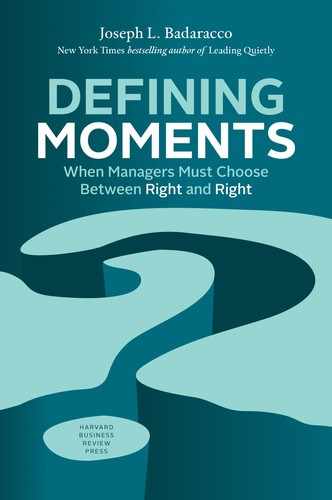40 D
EFINING
M
OMENTS
to the confusion, something now seems deeply wrong. The grand
principles seem to be asking you to subordinate your decision—
indeed, some of your deepest loyalties—to an abstract analysis of
impersonal duties. You are asked, it seems, to ignore the sort of
profound emotional commitment—in this case, a parent’s to a
child—that gives life meaning.
15
Given this drawback of the grand principles, on top of all the
others, it is no surprise that people look elsewhere for ethical guid-
ance. Writing in the eighteenth century, the Scottish philosopher
David Hume suggested that the sane reaction to a philosophical
morass was to climb out, clean oneself off, go home, have a good
dinner, and forget all about philosophy.
16
As rationality endlessly
chases its tail, people decide that principled reasoning can’t help
them very much.
Many people believe they have found a simple, user-friendly
alternative to moral philosophy, corporate law, and company mission
statements. They find no prospect of simplicity on the other side
of all these complexities. So, instead of relying on objective external
principles, they look for answers within themselves, in their moral
intuitions and instincts, and practice what can be called ‘‘sleep-test
ethics.’’
To the classic view that the unexamined life is not worth living,
sleep-test ethics replies that the overexamined life isn’t much good
either. Self-expression, spontaneity, authenticity, and being true to
one’s self—all these make sleep-test ethics a compelling alternative
to long, cerebral, often-frustrating searches for the right grand princi-
ples. Its basic idea is that, if people can sleep well after making a
difficult ethical decision, they have probably made the right choice.
Is this so?
..................Content has been hidden....................
You can't read the all page of ebook, please click here login for view all page.
